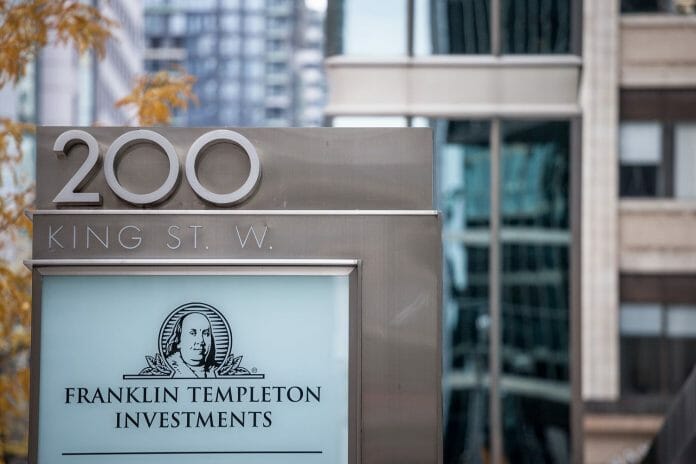Global and emerging markets equities manager Templeton Global Investments (Templeton) is constructive on equity markets in 2024, which could be driven by soft landing in the United States (US), evidence that interest rates have peaked, and rosier economic outlook in China.
In a statement today (Jan 16), the global investment firm said it favours global equities outside of United States (ex-US) including emerging markets and smaller companies.
“Price-to-earnings (P/E) valuations for these categories are below their long-term averages, with the MSCI USA Index trading significantly above its long-term average P/E.
“On a relative basis, the P/E gap between US and global ex-US equities is close to its highest level in over 20 years,” it added.
The firm said consensus expectations for global earnings growth is close to 10% in 2024, led by the United States following flat earnings in the prior year.
“By contrast, emerging market earnings growth is expected to accelerate to 18% in the year ahead, driven by South Korea and Taiwan. This represents a sharp recovery from the contraction in emerging markets earnings growth in 2023.”
Global Ex-US Equity Outlook
The firm said investor sentiment toward European equities remains depressed, with valuations below the long-term average. Growth remains soft as higher energy costs and the lagged effect of higher interest rates weigh on corporate and household balance sheets.
“Nevertheless, we note that over the past 30 years, European equities posted double-digit returns in the 24 and 36 months following the first Fed rate cut, and returns over 12 months have been positive,” it added.
In Japan, Templeton said inflation is broadening across the economy for the first time in decades, which is good news for corporate pricing power.
“Equities are expected to continue benefiting from the significant corporate reforms the Tokyo Stock Exchange has implemented, the unwinding of cross shareholdings, and the increase in payouts to shareholders.
“The Japanese Business Federation has also set out its proposal for tax reform. While Japanese market valuations have risen, they remain in line with global equity markets outside of US,” it said.
On emerging market equities outside of China have been resilient in the face of one of the fastest US rate-hiking cycles on record, the firm said.
“This reflects significant reforms over the prior decades, robust domestic consumption and healthy balance sheets. India and Mexico stand out as benefiting from prior reforms, which has attracted foreign investment and raised capital expenditure.
“South Korea and Taiwan could see a significant recovery in the year ahead as the technology cycle turns more favorable, driving earnings higher.”
Meanwhile, the Chinese economic outlook remains challenging.
“However, it looks like the economy is moving past the worst. While a swift rebound in growth is not anticipated, investors will welcome clear signs of a bottoming in growth, it said.
Drivers Of Optimism
As for the US, Templeton is in the view that a soft landing for the US economy is increasingly likely, given the healthy state of corporate, household and bank balance sheets.
“These have been buoyed by rising corporate margins, elevated savings, and manageable non-performing loans. Corporates have generally been able to weather the increased cost of debt as they did not borrow excessively when interest rates were low,” it said.
The firm said the rate of consumer price inflation in the United States has declined from 6.4% in January 2023 to 3.2% in November.
“Medium-term inflation expectations have remained well-contained, falling to 3% in October 2023. In combination with recent signs of softness in the labor market, there is increasing evidence to support the view that US interest rates have peaked.
“Over the past 30 years, the US Federal Reserve (Fed), has on average cut interest rates 10 months after the last increase. Based on history it is thus likely the Fed will cut interest rates around the second quarter of 2024, which is in line with current market expectations.”
The investment firm said over the past 30 years, global equity markets have on average risen 5% in the 12 months following the first Fed rate cut, with emerging markets returning 27% over the same period.
“In the 24 and 36 months following the first rate cut, global equities have risen 17% and 15% respectively, while emerging markets rose 27% and 23%.
“Expectations of the peak in the interest rate cycle and potential easing have already had an impact on the US dollar, which in the current cycle peaked in October 2022.
“A weaker dollar creates easier financial conditions outside the United States as it reduces the cost of debt in local currency terms, and this will typically encourage capital flow out of the United States in search of higher returns,” added the firm.
Geopolitics And Elections
In 2024, the firm said more than four billion people will take part in elections, starting with Taiwan in January and culminating with the United States in November.
“We think those in Taiwan and the United States are likely the most important for investors to watch. The Indian election is expected to see the incumbent Bharatiya Janata Party (BJP) party returned to power.
“Recent years have witnessed elevated geopolitical risks for investors. These include the Russia-Ukraine war, the war in the Middle East as well as tensions in East Asia.
“It is possible the Russia-Ukraine war will turn into a frozen conflict. Such an outcome, while unsatisfactory, could lessen energy and commodity price volatility, benefiting Europe and select emerging markets.









